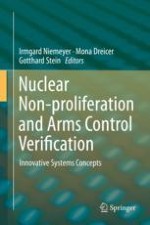2020 | OriginalPaper | Buchkapitel
Strategic Export Control
verfasst von : Filippo Sevini, Willem A. Janssens
Erschienen in: Nuclear Non-proliferation and Arms Control Verification
Aktivieren Sie unsere intelligente Suche, um passende Fachinhalte oder Patente zu finden.
Wählen Sie Textabschnitte aus um mit Künstlicher Intelligenz passenden Patente zu finden. powered by
Markieren Sie Textabschnitte, um KI-gestützt weitere passende Inhalte zu finden. powered by
